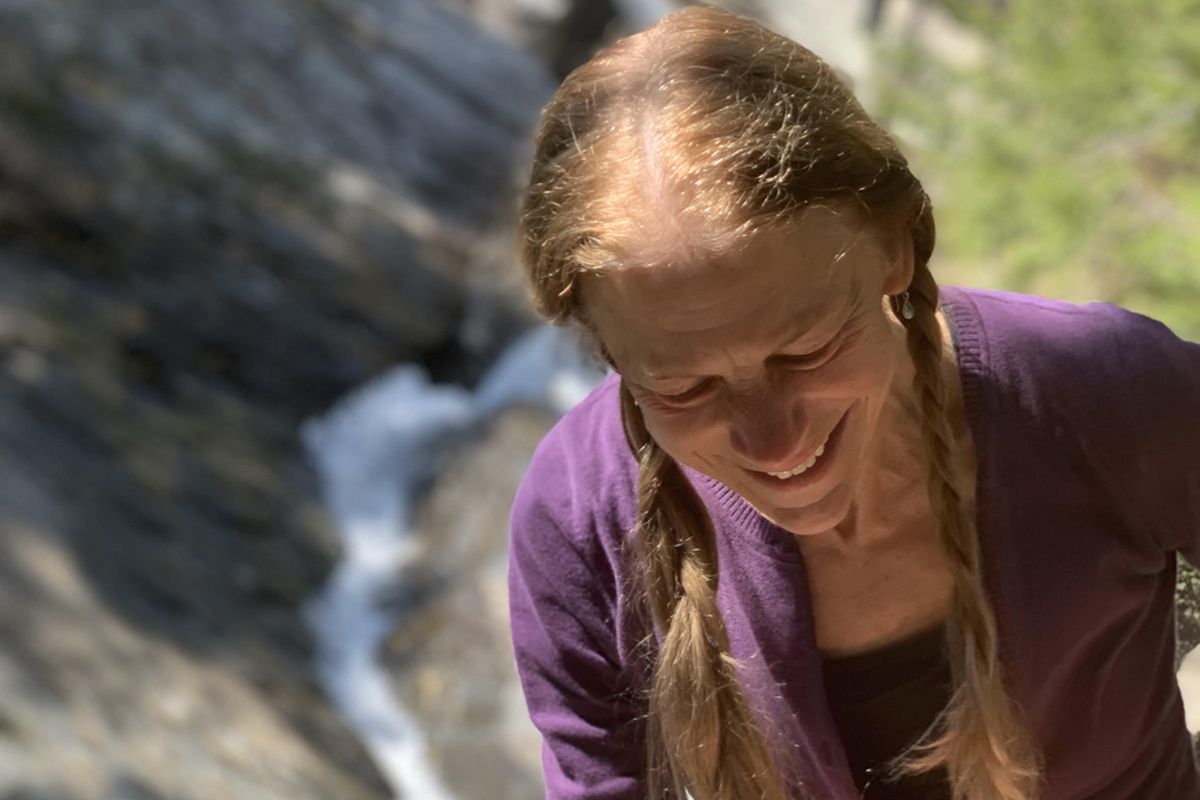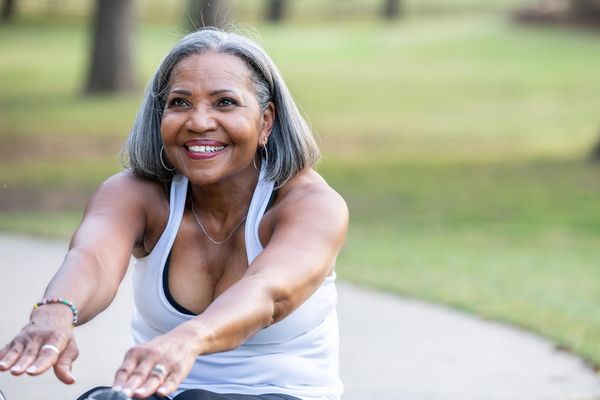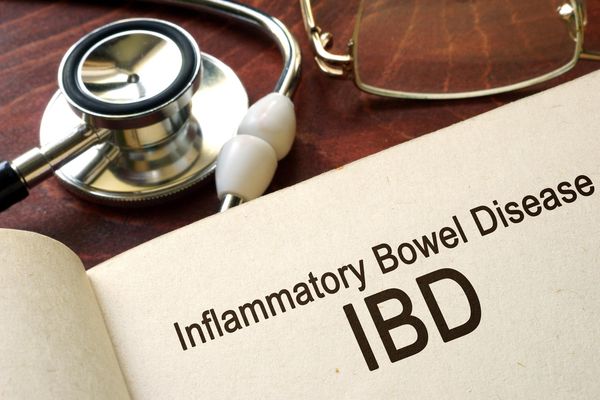I was 45 when I learned about the disease that was going to change my life. Until then, I'd lived mostly without significant personal struggle. As an adult, I'd celebrated the birth of three healthy babies and enjoyed a career I loved, working in the world of book publishing. My family formed the nucleus of my long marriage to my college boyfriend.
But under the surface, there were family tensions brewing: my husband was building our house (our dream since college), and I was working extra hours to help pay expenses while he took time off from his job. My father was diagnosed with cancer, and I grieved the death of one of my closest friends, a doctor, from breast cancer at the age of 41.
I masked the pain of emotional distress and a frequently upset stomach quite well, but when I was diagnosed with Crohn's disease, an incurable bowel condition, I learned about confronting pain and fear. This involved asking for help (Me, need help? Never!), and finding the courage to admit I was sick and open my heart to healing.
Inflammatory bowel disease (IBD) is an umbrella term that includes both Crohn's disease and ulcerative colitis. It's tough to live with and can affect a person at any age. Crohn's is a disease of the small intestine, whereas ulcerative colitis affects the large intestine. These diseases are on the rise exponentially, especially in the developed world where fast food and stress are increasingly prevalent.
Like many Crohn's patients, I was feeling pain on the inside while I looked OK on the outside. This disparity can be really hard. Plus, it's embarrassing to talk about having diarrhea, gas, bloating, cramping, vomiting and other digestive symptoms. Luckily, people can find support and information through the Crohn's and Colitis Foundation of America.
The problem was that I wasn't exactly taking care of myself: I often skipped meals, hardly ever exercised, worked late hours after the kids went to bed and made sure never to tell my clients about my frequent intestinal flare-ups. I hid the fact that I was sick every few weeks and always downplayed my illness.
After one such flare-up, I was admitted to our small-town hospital. During my stay, my providers gave me fluids and potassium to balance the electrolytes lost due to vomiting. The surgeon put me on a program called "bowel rest," in which I received nothing by mouth other than ice chips until things settled down. Later that week, a CAT scan revealed that I did indeed have Crohn's disease. There was no doubt.
From that day on, my life changed forever. I went into denial — how could I be sick? I tried to manage the stress in my life but eventually it came back, and I ended up in the hospital again a year later. This time, I had to have surgery to remove a foot-and-a-half of my large and small intestine.
The day of my surgery, my husband had to carry me out the door because I was too weak to walk (I hadn't had solid food in over three weeks). I remember my teenage daughter, Emma, looking at us with fear in her eyes and asking, "Is this going to be fatal?"
I was terrified. What if I had to wear an ostomy bag for the rest of my life? What about the ugly vertical scar on my belly?
Here is what I've learned: Scars tell stories. Today, I sometimes wear a bikini (the hell with it!).
Western medicine saved my life. My team at Dartmouth Hitchcock's IBD Center was amazing. When I left the hospital, I discovered that reducing stress in my life was the key to maintaining a healthy balance, since studies show that stress impacts digestion. I added daily probiotics as a supplement, an easy way to aid equilibrium in the gut microbiome. Crohn's disease is a tough diagnosis, but achieving gut-level homeostasis has been essential to how I keep a balance of good and bad bacteria.
I decided to write a book about living with Crohn's disease and ulcerative colitis, with naturopath Jessica Black, as a way to help others suffering from the disease. While I was doing my research, I remembered that a few years before my diagnosis, I'd gotten severe food poisoning from a fast-food chicken sandwich. I believe the bacteria that invaded my gut then created an inhospitable environment; no longer could the "good" bacteria and "bad" bacteria coexist in a kind of symbiotic balance.
When I started to take care of my gut microbiome by following the Specific Carbohydrate Diet, getting regular checkups with my IBD clinic doctor and naturopath and establishing a daily holistic lifestyle routine, my quality of life improved. After my surgery, I went from 119 pounds back up to 135 pounds. I began getting seven to eight hours of sleep. I'd wake up at 6:30, drink some tea and work on personal writing and poetry.
Today I follow this same routine. After writing, I head out for my daily walk (three to five miles over steep terrain), come back and do a short yoga and meditation practice and make my traditional Irish steel-cut oats breakfast. Only then do I hit the work scene at my home office. My morning regimen of yoga, exercise and a healthy breakfast helps keep me strong and grounded.
I try to stick to my sleep/walk/yoga/meditation routine and prioritize my work/personal life balance. Weekends are sacred downtime with longer hikes, dinner with my husband, a movie or a potluck or drinks with friends.
Autumn, even in these unsettling times of COVID-19, allows me to enjoy outside walks in the woods or on the beach. I've found that absorbing vitamin D through my eyes and skin is incredibly helpful in keeping my immune system strong.
This is my Crohn's story. Sharing it through my writing has been a way to aid those who are newly diagnosed with this lonely and debilitating disease or those who have a loved one who is living with it. By chronicling my health journey, I hope to encourage women, especially, who often have to juggle work, childcare, family, grocery shopping, etc., while maintaining their health and managing stress.
After my book came out, a young mother from New Hampshire wrote to me and said reading my book was "a light in the darkness." That made it all worthwhile.
Dede Cummings is a poet, writer, book designer and publisher. Her second poetry collection, The Meeting Place, was published in spring 2020 by Salmon Poetry. Dede lives in Vermont where she designs books and runs Green Writers Press. For information, visit https://dedecummingsdesigns.com/
- Crohn's Disease: It Didn't Keep Me From the Olympics, and It Won't Stop Me Now - HealthyWomen ›
- Eating Well with Crohn's Disease - HealthyWomen ›
- Crohn’s and Colitis Don’t Have to Rule Your Life - HealthyWomen ›
- Could It Be Crohn’s or Ulcerative Colitis? - HealthyWomen ›
- A Letter to My Diagnosed With Crohn's Self–From the Future - HealthyWomen ›
- On Reaching Remission of Crohn's Disease - HealthyWomen ›







